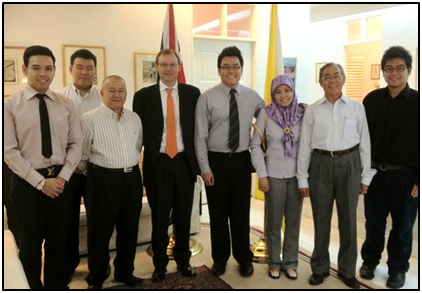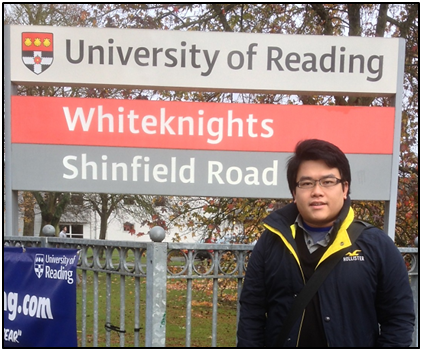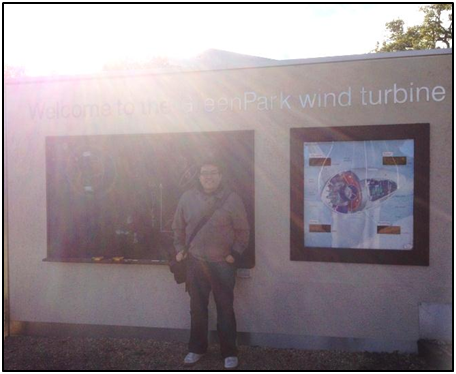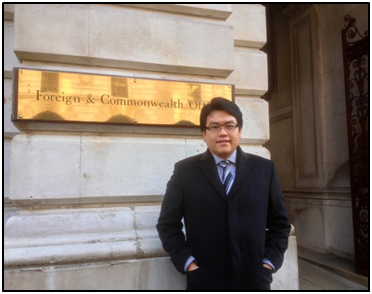21st December 2012 London, UK
Realizing a dream – Abdul Matiin’s Guest Blog
Realizing a dream
It was such an honour to have been awarded the Chevening Scholarship. I remember during my high school years reading articles in the Borneo Bulletin about scholars being awarded the prestigious Chevening grant every year. Never in a million years would I have thought that one day I would be following in their footsteps. It was exactly a year ago, in December 2011, when this life-changing experience began. After submitting the application form, shortlisted for the interview, receiving the award letter, everything else went by quickly leading up to my departure. The staff at the British High Commission made it absolutely certain that we were thoroughly briefed before embarking on this great journey.
Leaving on a jet plane
Having studied in the UK previously and knowing how living essentials were abundant especially halal food, packing was relatively straightforward. The memory of me packing almost everything filled to the brim during my first year undergraduate studies really got me smiling. It was not surprising when my checked-in luggages weighed 15 kilograms below the maximum limit. Before leaving, the British High Commissioner hosted a farewell reception for both myself and Norali. The inspiring speech by His Excellency Mr Rob Fenn, left me motivated and further honoured to pursue my Masters studies. With this, I was all set! I said my goodbyes to my family and friends and time finally came for me to leave.
The cold! It felt so refreshing, just as I had remembered it. It was not winter just yet but in comparison to Brunei’s climate, it was chilly! Thankfully it was not raining and the sun was out. Full of excitement, I made my way from the ever-busy Heathrow to Reading. A hotel was the perfect compromise between settling down immediately and sleeping off my jetlag, and there I was, bedridden for another 15 hours. Re-energised, I went out house hunting, this proved to be a difficult task as most of the good-looking houses were already gone by the time I arrived. Soon after, luck was on my side, I found a comfortable two-bedroom flat within walking distance of the University and settling-down came naturally.
Back to student life
Reading, as the name implies, is quite a good place to study. The town, which has a population of 235,000, has a proud history of welcoming people from across the globe and it has a friendly multicultural vibe. The University of Reading has the old country impression with academic departments and red-brick buildings separated by large grass fields. It takes about 25 minutes to walk from home to the School of Construction Management and Engineering, which is the department for the MSc Renewable Energy: Sustainability and Technology course. The first week had me running around the university getting lost and attending induction programs, the most informative being the ‘Library Induction’-this was personally the most important as I expect to be spending a lot of time there. The course which I am currently enrolled is not solely concentrating on Renewable Energy, but it also addresses comparative assessments of different energy generation methods, including fossil fuels and nuclear. The modules are generally theoretical in nature, mostly looking into the technical, economical, social and environmental aspects. There are lots of international students attending the course, which, personally, makes it more interesting. During my first lecture week, the realisation that I am back into student life hit me – Will I be able to blend in quickly to university life after having left it for 3 years? Will I easily grasp the teaching materials?
I took the entire weekend to absorb as much as I could from the resources given and understand the pedagogical system of using online portals, just to keep up with the self-assessed pace. Eventually, I felt geared up and ready to begin my life as a postgraduate. With previous working experience in the energy field, I begin to appreciate the lectures more. I could relate more to the teachings than I could have possibly imagined. I hope this will continue and pray that success is within reach, insyaAllah. After weeks of attending lectures, I can sum up the teaching quality to be excellent, well-delivered and the contents are as it states within the prospectus. We have so far visited a solar and wind farm in Swindon, a hydroelectric turbine in Mapledurham which is powered by the Thames River and a coal and gas power plant, in Didcot near Oxford to aid in our understanding and evaluation of renewable and non-renewable energy resources. This has opened my mind to great possibilities within the energy industry, particularly, on its application within Brunei. The course also exposed me to the UK energy industry, which is guided by the energy policies made by DECC (Department of Energy and Climate Change), the UK energy authority and regulator.
Welcome Reception at the FCO
On Monday the 5th of November, the second group of Chevening scholars were invited to a welcome event at the Locarno Suite, Foreign and Commonwealth office, which shares the same building as the Prime Minister’s office at Downing Street. The ambience felt very formal and professional, particularly when we had a speech by MP Hugo Swire, Minister of State for the Foreign Office. The main aim of the reception is to welcome the 2012-2013 Chevening scholars and provide them with opportunities to network with others. I met scholars who came from different parts of the world with various backgrounds and we exchanged our contacts. Thanks to the facebook page for Chevening, we can further keep in touch and prolong the friendships made. After the reception, we were brought on a tour to visit the UK Parliament in which we visited both the House of Commons and House of Lords.
UK adventures so far
The UK is a special place to my wife and I; we met while studying in the UK. On her recent visit, we revisited all the wonderful places in London. We walked all the way from the famous shopping streets in London – Oxford Street and Regent Street, down to the eventful Piccadilly Circus, the beautiful monuments at Trafalgar square and finally to Westminster’s Big Ben and the London eye. It was quite a distance but we enjoyed every moment of it! It is comforting to know that Reading is only 20 minutes away from Paddington, London by train. Although I have missed out the London Olympic Games and the Queen’s diamond jubilee celebrations, I am certain that there are more fascinating events that UK can offer in the future.
Abdul Matiin Hj Muhammad Kasim
Brunei Darussalam’s Chevening Scholar 2012-2013






